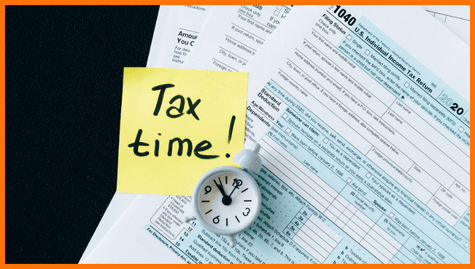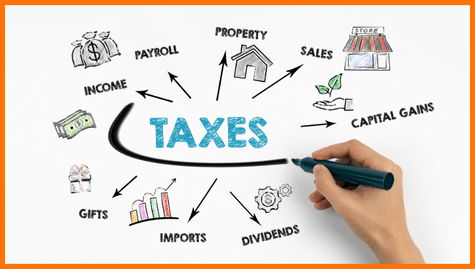Homeowner Tax Deductions
It’s tax time, which means you have until the middle of April 2024 to cash in on the 2023 tax year. it’s time to reap all the best homeowner tax deductions and credits to maximize your return (or reduce how much you owe). No matter what, it’s a win-win because every deduction and credit add up to a better outcome for your tax return. Let’s see what perks taxpayers can reap this tax year.
- Note: Though we know much about real estate, we aren’t bonafide tax professionals like our friends at Dickson & Associates. If you are a first-time homeowner or just became an investor, you should work with a certified pro to not miss any of your tax exemptions. Before you do any taxes, speak with a pro to maximize your return!
Disclaimer: This blog is for informational purposes only but not a complete guide. Please consult a tax professional for the most accurate and up-to-date information regarding tax credits.
Deductions vs. Credits
Your tax deduction is the amount you can deduct from your total taxable income. The higher your deduction, the less income the government can tax. You can either use standard or itemized deductions. Itemizing requires more calculations, but it can add up in your favor if your financial activity involves a lot of deductible expenses like charitable donations. For 2023, the standard deductions are:
- Single or Married Filing Separately: $13,850
- Married Filing Jointly or Qualifying Widow(er): $27,700
- Head of Household: $20,800
If the itemized deduction totals more than your standard deduction, you should use it to reduce your taxable income, which results in getting taxed less. Cha-ching! ?
Tax credits are dollar-for-dollar reductions on the total tax owed.* If you owe zero, then credits become money that goes right back to you. If you owe on taxes, credits can reduce this amount, so you owe less. The more credits, the better for your bottom line.
*In most cases. Some credits, like the Mortgage Interest Tax Credit, won’t be refunded past your tax calculated.

Homeowner Tax Deductions for the 2023 Tax Year
1. Mortgage Interest Deduction
Of all the tax deductions, this is the biggest one homeowners can claim. If you have a home loan, your monthly payment contains at least the principal amount and mortgage interest. You can claim all the interest paid while you pay back your home mortgage debt as an itemized deduction. You can also do this with a second home or investment property.
2. Home Equity Loan Interest
If you took out a home equity line of credit (HELOC) on your house, then you can claim its interest. However, you can only claim this tax benefit if you use the money to improve your home. It isn’t applicable if you use it to buy a new car or boat.
3. Discount Points
If you paid extra toward your loan interest to reduce your mortgage’s interest rate, then you can claim these mortgage points at tax time. Just another perk of homeownership!
4. Property Tax Deductions (State & Local)
You can deduct any taxes you pay on your property for up to $10,000 per married couple filing jointly or $5,000 if filing separately. This includes state and local income taxes or sales taxes.
5. Necessary Home Improvements
If you need to make permanent changes to your home for medical reasons, these improvements typically qualify as a deduction. Examples include ramps to enter your house, shower railings, widening doorways, or a staircase escalator chair.
6. Home Office Expenses
The size of the deduction is based on the percentage of your home dedicated to the place of business. This tax break is only for self-employed people and not people who work remotely at home through a company. This real estate tax deduction can greatly help maximize your returns.
7. Mortgage Insurance (PMI) Payments
If you paid less than 20% for your down payment, then your lender may require you to pay private mortgage insurance (PMI) with your mortgage payment. This additional cost can be deducted from your taxes.

Tax Credits for Homeowners
Tax credits are dollar-for-dollar reductions from your final tax bill that can reduce what you owe or increase your return. No matter what, they are helpful! Here are some to claim today.
1. Mortgage Interest Tax Credit
Eligible to first-time homebuyers, this is an awesome tax credit that can easily be missed. Check with your lender if you can get a Mortgage Credit Certificate, which allows you to claim a percentage of your mortgage interest as a tax credit. This is a great help if you are in danger of owing on federal taxes. However, unlike most credits, if you don’t owe, you won’t get any money back. This can still get you out of owing a lot, so claim it!
- Note: Refinancing your loan removes this tax credit.
2. Eco-Friendly Home Improvements Credits
Home energy improvements can get you money back this year via the Residential Clean Energy Credit and Energy Efficient Home Improvement Credits. You’ll get credits for installing eco-friendly measures like an electric car charging station or solar power. For more information, read our blog about it.
Miscellaneous Homeowner Bonuses
Capital Gains Tax Break
Capital gains are the amount you make after selling your home. If you lived in the house as a primary residence for at least two of the last five years, a single filer could keep up to $250,000 — tax-free. A married couple filing jointly can keep up to $500,000 without owing any taxes on the earnings. Also, individual filers with a total taxable income under $44,625 won’t pay any capital gains tax for the 2023 tax year.
Reducing Capital Gains
If you make a big-ticket repair like a new roof or refinished floors to a home that you sold, you can deduct these costs from your total capital gains. If you expect your capital gains to exceed the non-taxable amount, then you should keep all records of these pre-home sale costs for your upcoming tax return. They may just get you right in the zone of the tax-free amount.
Homeowners Who Go to School
It’s cool to be in school, especially when you can get your money back for investing in yourself. We’re proud of you! Now head over to your tax software ( or tax pro) and claim these bonuses!
- American Opportunity Credit: You can claim the first $2,000 spent on school-related expenses like tuition, books, tech, and fees. After that, you can claim 25% off the next $2,000 paid for a maximum credit of $2,500. This doesn’t include living expenses.
- Lifetime Learning Credit: If you don’t qualify for the American Opportunity Credit, you can claim 20% of the first $10,000 paid toward school tuition, supplies, and fees. This results in a maximum credit of $2,000.
- Student Loan Interest Deduction: Borrowers of student loans can deduct up to $2,500 from their taxable income if they pay student loan interest.

Bonus Credits and Deductions
Various life situations can give you even more savings. If your money has gone to significant expenses like hospital bills and childcare, then you should tell your tax pro about them. You can get some relief on taxes by doing a little digging into this year’s financial activities.
- IRA contributions
- 401(k) contributions
- Health savings account contributions deduction
- Self-employment expenses deduction
- Extra Home office deductions
- Educator expenses deduction
- Charitable donations
- Medical expenses
- Gambling loss
- Child and Dependent Care Credit
- Child tax credit
- Earned income Tax Credit
- Adoption credit
- Various credits and deductions offered by your state.
Please note that all these deductions and credits are some of the biggest perks and not meant to be a comprehensive list. Your tax pro may find even more ways to help you get the best tax return possible by working personally with you and helping you take advantage of your unique financial profile and activities.
Bonus x2: First-Time Homebuyer Government Programs
If you just bought your first home (or haven’t owned a home in the past 3 years), you can qualify for additional aid. While not all of these are related to taxes, they provide enough potential for savings to be worth your exploration. Check them out here.
Use The Best Homeowner Tax Deductions in 2023’s Tax Forms
Every little bit helps when it comes to maximizing your return. Working with a tax pro will get you the best results possible for your tax bracket and financial situation. Contact us if you’d like to become a homeowner and experience some of these excellent tax breaks.


